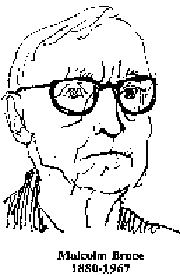Malcolm Bruce, 1880-1967
Workers Vanguard, Mid-May 1967
by Allan Engler
Malcolm Bruce, one of the leading figures in the history of Canadian
working class politics, died April 29 at the age of 87.
Malcolm was a founding member of the Socialist Party of Canada, later
the Communist Party, and then the League for Socialist Action—and a member
of the CCF and NDP until his death.
At his funeral services members of all the left-wing tendencies were
present: Arthur Turner, former NDP and CCF MLA and MP; Tom McEwen of the
Communist Party; and representatives of the League for Socialist Action
and the Progressive Workers Movement.
Malcolm was born in PEI in 1880. His first experience in the class
struggle occurred in 1898 when he took part in the bricklayers strike in
Sydney, N.S., where he worked as a helper building the foundries for the
Dominion Steel Co.
In the early 1900’s he moved to the United States. He became a member
of the Western Federation of Miners and worked in Utah and Butte, Montana.
He became president of his local in Utah at the time of the
Mooney-Billings case, two labor leaders who were framed for the
assassination of the governor of that state. He played a leading role in
their defense and became a close friend of Bill Haywood, the founder of
the WFM and the IWW.
In 1912 he moved to Regina and worked as a carpenter, becoming a leader
of the local during a general strike of building trade workers in 1913. He
also became active in the Socialist Party of Canada, whose predecessor,
the Provincial Association of Nova Scotia, he had been a member of in the
early 1900s. In Regina he was one of the best known opponents of the First
World War. He became unpopular for his support of the Irish Easter
Rebellion in 1916; but his outspoken defense of James Connolly and his
comrades made him the leader of those members of the SP who supported the
Russian Revolution in 1917.
When the Socialist Party split over the question of joining the Third
International, led by Lenin and Trotsky, the bulk of the Regina Branch,
under Malcolm’s leadership, opted for membership in the Communist
International.
He participated in the underground Communist Party launched in
1919—illegal due to the witch-hunt after the Winnipeg General Strike, and
the spilling over of the hysteria of the Palmer raids in the U.S. He was a
delegate, representing three prairie cities, at the founding of the
Workers Party in 1921, and became editor of the party’s newspaper, The
Worker, as well as a member of the central committee. A year or two
later the Workers Party changed its name to the Communist Party.
After addressing a May Day meeting in Nova Scotia in the early 1920s he
was charged with subversion, but escaped the province with the help of
some members of the local police force who were sympathetic to the
striking miners he was addressing. After running as a candidate for the
Canadian Labor Party in Toronto in 1923—an election he almost won—charges
were dropped.
He returned to the U.S. in the middle 1920s, trying to organize
carpenters in the growing movie industry in Los Angeles and participating
in the Communist Party there until he was deported several years later.
He returned to Canada, settling in Vancouver where he became editor of
the BC weekly of the Communist Party. In 1931, he and six other CP leaders
were jailed under the notorious Section 98 of the Criminal Code. He
remained in jail for three years. After his release he participated in the
Communist Party in Vancouver—until the early forties when he and dozens of
other trade unionists and activists in the unemployed movement quit in
opposition to its policy of "Liberal-Labor Coalition" and its growing
bureaucratization.
During the late 1940’s he reactivated himself in the trade union
movement and the CCF, becoming one of its most vocal left-wing spokesmen.
He was an opponent of the Korean War, and an opponent of the witch-hunt.
During the middle 1950’s, when already over 70, Malcolm became
convinced that Trotsky was right in his analysis of the degeneration of
the Soviet Union and on the need to build a new International. He joined
the Trotskyist movement in Vancouver.
Malcolm played a key role in convincing members of the CCF that the
formation of the New Democratic Party—the merger of the CCF and the CLC—was
a positive step. In 1961, Bruce, with Ruth Bullock, representing Vancouver
socialists, and Ross Dowson. representing Toronto socialists, launched
the League for Socialist Action.
In the last years of his life he became disillusioned with LSA support
for the NDP, and resigned from the organization. But to the very end he
considered himself a Trotskyist.
Malcolm was a close comrade of many of Canada’s best revolutionary
fighters: Jack Kavanagh, leader of the B.C. Federation of Labor and
founder of the One Big Union and the Communist Party, who very early
became a Trotskyist; Maurice Spector, theoretical leader of the Canadian
CP; Jack MacDonald, militant working class leader and first secretary of
the Canadian CP—both expelled for Trotskyism Jim McLachlan, powerful
miners' leader in Nova Scotia and Communist who died almost in disgrace in
the party he did so much to build because he was critical of the Moscow
Trials and the Liberal-Labor Coalition policy.
Malcolm and all of them were courageous, dedicated, and determined men.
Today they are forgotten, by the trade union movement and the working
class organizations they did so much to build.
The new generation of militant workers and socialists have the
responsibility of restoring them to their rightful places of honor in the
history of the Canadian working class.
[ Top ] [
Obituaries Index ]

